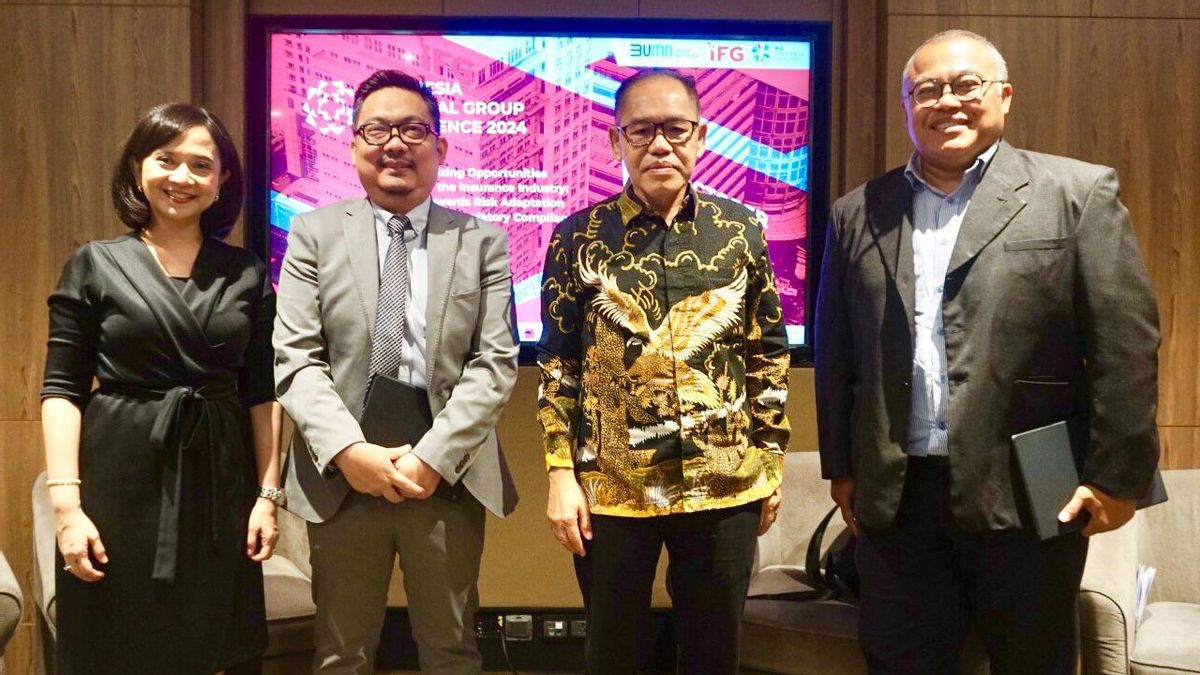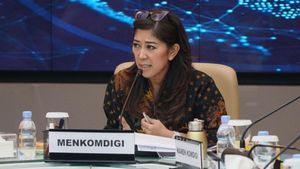JAKARTA - The Non-Bank Financial Industry (IKNB), particularly insurance, is currently facing various risks and challenges that continue to grow. Not only is it influenced by external factors such as macroeconomic uncertainty and fluctuations of global conditions, but also by internal factors such as tighter corporate governance. In this situation, adaptation to risk becomes increasingly crucial to maintain business sustainability and strengthen the role of the insurance industry in supporting the stability of the financial sector.
The importance of good corporate governance cannot be ignored. In recent years, regulations in this sector have been tightened, and insurance companies are required to have a governance system capable of answering the latest challenges. An organizational culture that is ethical and accountable to accountability is also key in building public trust and maintaining the reputation of industry.
Responding to the challenge, IFG Conference 2024, carries the theme Seizing Opportunities in the Insurance Industry: Towards Risk Adaptation and Regulatory Compliance. This event was organized by IFG Progress, the think tank Indonesia Financial Group (IFG), the Insurance SOE Holding, Guarantee, and Investment in Jakarta, on Tuesday 15 October.
Present as a keynote speaker at the conference were Deputy Chairman of the Board of Commissioners of the Financial Services Authority (OJK) Mirza Adityaswara, Assistant Deputy for Insurance Services and KBUMN Pension Fund Hendrika Nora Osloi Sinaga, and IFG President Director Hexana Tri Sasongko, as well as a number of qualified sources from academics and other agencies who will fill the session at this conference.
"We really appreciate the holding of this IFG Conference 2024. IFG through IFG Progress can provide basic data and information in the insurance industry, which is very rare, but is urgently needed by industry," Mirza said.
Mirza said, in line with changes in regulations, his party invited the insurance industry to transform through strengthening capital, governance, and risk management. This departs from the condition of the Indonesian insurance industry which is still relatively low in terms of density, penetration of GDP, to literacy and inclusion.
In line with the high economic growth target of the new government, the role of the financial sector as a funding provider for the business world is important. However, compared to developed countries, funding in Indonesia is still dominant in the banking sector rather than insurance, pension funds, and fund managers.
Through the roadmap that was prepared, the insurance density is targeted to reach 2.4 million rupiah by 2027. In addition, one of the OJK's focuses in strengthening and developing the insurance sector is in terms of capital and transformation of governance in the insurance sector, guarantee and pension funds (PPDP) through the issuance of POJK Number 23 of 2023. In addition, the implementation of PSAK 117 in the context of capital strengthening continues. We hope that by 2025 the full way will be completed and the study of RBC calculations will further describe the level of solvency. This is to encourage insurance companies to contribute more to national economic growth," he said.
In line with that, Hendrika emphasized, the insurance industry is facing major changes influenced by macroeconomic factors, micro-factors, technology factors, changes in consumer behavior, and new risks that arise, which were not previously predicted. However, behind these changes, there are also great opportunities that can be taken advantage of.
Hendrika added that the contribution to the national economy was also carried out by state-owned companies through two functions, namely as a value creator and agent of development. BUMN companies must fulfill the fulfillment of public interests and and act as industrial pioneer agents, especially supporting economic growth through the completion of various national strategic projects and mobilizing active participation in the populist economy, developing MSMEs, and supporting the distribution of subsidies for the community.
In this case, IFG as a holding has various goals. One of the main pillars is the role of IFG as an agent of development in increasing financial literacy. The implementation of IFG Conference is proof of IFG's commitment to increase financial literacy," he said.
In line with that, Hexana explained, this third annual IFG conference is a form of IFG's commitment to strengthen the insurance industry in order to contribute more significantly to the national economy. IFG held this event as a forum for policymakers, industry players, associations and other stakeholders, to discuss and provide solutions in facing current and future challenges related to the development of the insurance industry in Indonesia.
BACA JUGA:
The first session at this conference discussed four main sub-topics, namely the impact of macroeconomic risk on the insurance sector, insurance governance, health care systems, and challenges in health insurance. This discussion begins with exploring macroeconomic risks as well as their impact on insurance companies, to effective risk management strategies to support MSMEs and business entities during economic uncertainty. After highlighting external risks, further discussions emphasize the importance of cultural transformation in the insurance industry in order to create healthy sustainability in the long term.
Furthermore, discuss the challenges in the health care system, such as increasing medical inflation and increasing the volume of claims, especially those that have an impact on health insurance providers in Indonesia. This discussion is expected to uncover strategic solutions related to these challenges in order to improve operational efficiency and maintain business in a sustainable manner.
In the second session of IFG Conference 2024 presented three interactive discussions focused on regulatory challenges, reinsurance capacity and agricultural insurance. The first discussion discussed new capital requirements based on POJK No. 23/2023, explored its implications for financial resilience, and identified opportunities for growth. The second discussion discussed strengthening the capacity of resurance in response to market conditions and growing regulations.
"Finally, in the third discussion highlighted the importance of agricultural insurance in supporting food security and encouraging the sustainability of the agricultural sector," he concluded.
The English, Chinese, Japanese, Arabic, and French versions are automatically generated by the AI. So there may still be inaccuracies in translating, please always see Indonesian as our main language. (system supported by DigitalSiber.id)
















